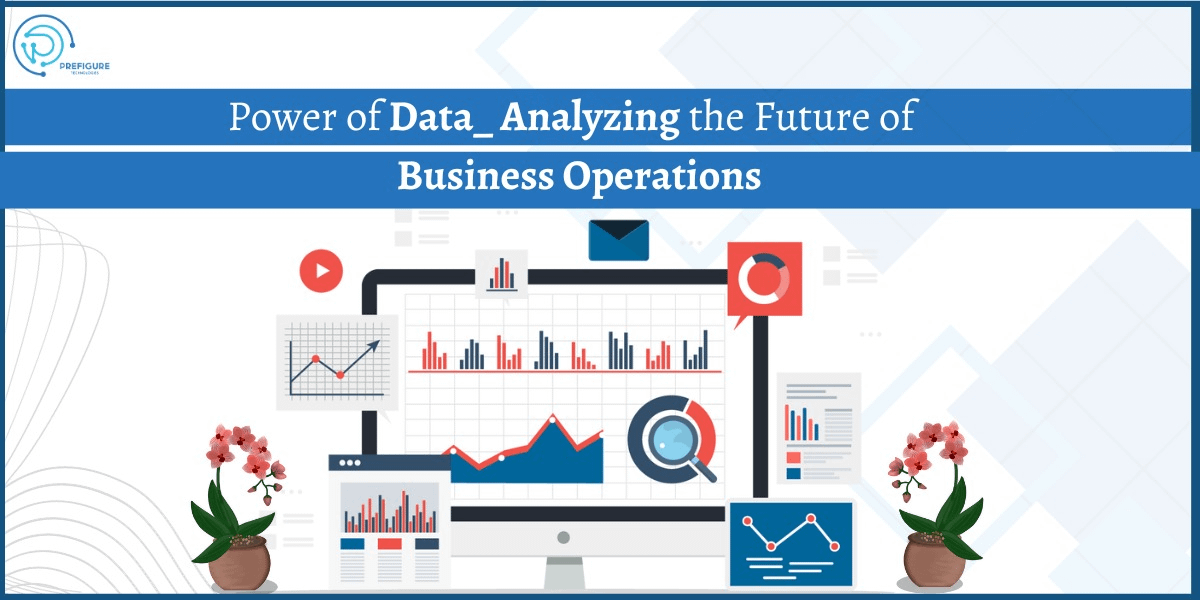Vipul Sharma, 27 September
Table of Contents
1. Introduction Of Data-Analyzing:
In today’s digital age, data has become one of the most valuable resources for businesses. From customer preferences to market trends, the power of data analysis cannot be overlooked. In fact, it is transforming the way businesses operate and make decisions for the future. With the help of advanced technologies and tools, businesses across industries are now able to gather, analyze, and interpret data to gain valuable insights and drive growth. This blog explores the power of data and its impact on the future of business operations.

2. The role of data in shaping business operations:
Data has now become the backbone of modern business operations. It plays a crucial role in shaping strategic decisions, optimizing processes, and enhancing overall efficiency. By capturing and analyzing data at every touchpoint, businesses can gain a deeper understanding of their customers, identify emerging trends, and predict future market demands.
For instance, data analytics allows companies to track customer behavior, preferences, and buying patterns, enabling them to personalize their offerings and deliver a superior customer experience. It also helps businesses in forecasting demand, improving supply chain management, and optimizing resource allocation.

Moreover, data-driven insights empower businesses to make informed decisions, mitigate risks, and seize new opportunities. By embracing data-driven strategies and technologies, companies can refine their operations and stay ahead in today’s competitive landscape.
In the next section, we will delve into the various ways in which data is transforming specific areas of business operations and driving organizational success. Stay tuned to discover the exciting possibilities that lie ahead!
3. Leveraging data for strategic decision-making:
In today’s data-driven world, businesses have access to an abundance of information that can be used to make strategic decisions. By leveraging data to gain valuable insights, organizations can make informed choices that drive their success.
One of the main benefits of using data for strategic decision-making is the ability to identify trends and patterns. By analyzing large sets of data, businesses can spot emerging market trends, consumer preferences, and industry shifts. Armed with this knowledge, organizations can proactively adjust their strategies to stay ahead of the competition.
Data also helps in mitigating risks and making accurate predictions. By examining historical data, businesses can identify potential risks and develop contingency plans. Furthermore, predictive analytics can assist in forecasting demand, allowing companies to optimize inventory and improve resource allocation.

Moreover, data-driven decision-making enables businesses to personalize their offerings and deliver an exceptional customer experience. By analyzing customer data, organizations can tailor their products or services to better meet individual needs. This not only enhances customer satisfaction but also boosts loyalty and drives repeat business.
In the next section, we will explore how businesses can harness the power of data to streamline operations and improve efficiency. Stay tuned for valuable insights on how data can transform various aspects of business operations!
4. Improving operational efficiency through data analysis
In order to stay competitive in today’s rapidly evolving business landscape, companies must embrace the power of data analysis to improve operational efficiency. By leveraging data insights, organizations can identify areas for improvement, streamline processes, and drive overall productivity.
One way data analysis can enhance operational efficiency is by identifying bottlenecks and inefficiencies within existing processes. By collecting and analyzing data on key performance indicators (KPIs), businesses can pinpoint areas where productivity is lagging and implement targeted solutions. This could involve automating manual tasks, optimizing workflows, or reallocating resources for maximum efficiency.
Furthermore, data analysis can also help businesses identify cost-saving opportunities. By analyzing expenditure data, organizations can identify areas of unnecessary expenditure, negotiate better pricing with suppliers, and optimize supply chain management. These data-driven insights can lead to significant cost reductions and improved profit margins.

Additionally, data analysis can improve decision-making in resource allocation. By analyzing historical data on resource usage and demand patterns, organizations can make more accurate predictions and allocate resources accordingly. This not only ensures that resources are used efficiently but also minimizes waste and improves overall operational effectiveness.
Stay tuned for the next section where we will discuss how data analysis can be utilized to enhance customer engagement and satisfaction, driving business growth and success.
5. Predictive analytics: Anticipating future trends and adapting proactively:
As businesses strive to stay ahead in today’s ever-changing market, the ability to anticipate future trends and adapt proactively is crucial. This is where predictive analytics comes into play. By harnessing the power of data analysis, companies can leverage historical data to make informed predictions about future industry trends, customer behavior, and market demands.
Predictive analytics enables businesses to take a proactive approach by identifying opportunities and mitigating risks in advance. By analyzing patterns, correlations, and trends within their data, organizations can forecast customer preferences, predict market fluctuations, and optimize their strategies accordingly.
For instance, predictive analytics can help businesses optimize inventory management by forecasting demand trends, reducing wastage, and ensuring sufficient stock levels. By accurately predicting customer needs, companies can improve customer satisfaction, reduce costs, and drive sales.

Moreover, predictive analytics can enhance marketing efforts by enabling businesses to target the right audience at the right time. By analyzing customer data, organizations can personalize marketing campaigns, predict customer churn, and implement strategies to retain customers.
In conclusion, harnessing the power of predictive analytics empowers businesses to make proactive decisions, adapt to changing market dynamics, and stay one step ahead of the competition. Stay tuned for the next section where we will explore the role of data analysis in enhancing operational agility.
6. Enhancing customer experience through data-driven insights:
In today’s highly competitive market, businesses are constantly striving to enhance customer experience and build strong relationships with their target audience. One way to achieve this is by leveraging data-driven insights. By analyzing customer data, businesses gain valuable insights into customer preferences, behaviors, and needs, allowing them to tailor their products and services to meet these specific demands.
Data-driven insights enable businesses to understand customer pain points, anticipate their needs, and provide personalized experiences. By analyzing customer feedback, purchase history, and behavioral patterns, companies can develop targeted solutions that anticipate and address customer needs. This ultimately leads to improved customer satisfaction and loyalty.

For instance, through data analysis, organizations can identify patterns and trends in customer interactions, allowing them to implement proactive measures to enhance customer experience. By understanding customers’ preferences, organizations can personalize marketing messages, recommend relevant products and services, and provide timely support.
Furthermore, data-driven insights can also help businesses identify areas of improvement within their operations. By analyzing customer feedback and sentiment analysis, companies can identify potential pain points and make necessary changes to streamline their processes and deliver better customer experiences. In conclusion, leveraging data-driven insights is essential for businesses looking to enhance customer experience. By understanding customers’ needs and preferences, companies can develop personalized solutions, improve operational efficiency, and ultimately drive business growth. Stay tuned for the next section where we will explore the role of data in improving operational agility and efficiency.
7. Data security and ethical considerations in the age of advanced analytics:
As businesses continue to harness the power of data to drive their operations, it is crucial to address the growing concerns around data security and ethical considerations. With advanced analytics techniques becoming increasingly sophisticated, the need to ensure the privacy and security of customer data has never been more critical.
Data breaches and cyber-attacks pose a significant threat to businesses and their customers. Therefore, adopting robust data security measures is essential to protect sensitive information from unauthorized access or use. This includes encrypting data, implementing firewalls, and regularly monitoring and updating security systems to stay ahead of potential threats.
Alongside data security, businesses must also consider the ethical implications of using customer data for analysis. It is essential to obtain proper consent from customers and ensure that they are aware of how their data will be used. Transparency in data collection, storage, and usage practices will help build trust and maintain the integrity of the customer-business relationship.

Furthermore, businesses must take steps to responsibly handle data, ensuring it is used for legitimate purposes and in compliance with data protection regulations. By doing so, they not only protect the privacy of their customers but also uphold industry standards and maintain a positive reputation.
In conclusion, as companies continue to explore the vast potential of data analytics, they must prioritize data security and ethical considerations. By implementing stringent data security measures and adopting ethical practices, businesses can build trust with their customers, safeguard their data, and navigate the future of business operations with integrity. Stay tuned for the next section, where we will discuss the impact of data analytics on decision-making and strategic planning.
8. Conclusion: Embracing the power of data in transforming business operations:
In this blog series, we have explored the power of data analytics and its impact on the future of business operations. From uncovering valuable insights to improving efficiency and innovation, data analysis has emerged as a game-changer for businesses across industries.
By leveraging advanced analytics techniques, companies can gain a competitive edge, enhance customer experiences, and drive profitability. The ability to make data-driven decisions allows businesses to understand market trends, customer preferences, and industry dynamics more accurately. This, in turn, enables them to proactively adapt their strategies and stay ahead in a rapidly evolving marketplace.
However, with great power comes great responsibility. It is essential for businesses to prioritize data security and ethical considerations. By safeguarding customer information and using data responsibly, companies can not only build trust but also comply with data protection regulations and maintain their reputation.
To fully embrace the power of data, businesses must invest in technology infrastructure, data management systems, and analytical capabilities. They must also cultivate a data-driven culture, where employees are empowered to make decisions backed by data and are equipped with the skills to interpret and apply insights effectively.
The future of business operations lies in harnessing the power of data analytics. As the digital landscape continues to evolve, it is crucial for businesses to stay ahead of the curve and capitalize on the vast potential that data holds. By embracing data-driven strategies, companies can propel their growth, improve operational efficiency, and stay relevant in an increasingly competitive market. Thank you for following this blog series on the power of data in transforming business operations. We hope that you have found these insights valuable and informative. If you have any questions or would like to discuss further, please feel free to leave a comment or reach out to us.

